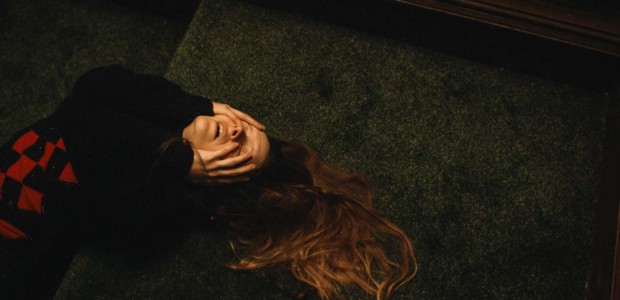Rose Glass’s SAINT MAUD is a feature with the storytelling scope of a short film. That’s not necessarily a bad thing – many genre films thrive fully on a simple premise with little exploration into the backstories of its characters. 2015’s DARLING is such a film, tracing one young woman’s descent into madness in an old New York City apartment. With that film, director Mickey Keating duplicates the aesthetic of early Hollywood arthouse horror, using black and white color as an opportunity to capitalize on the natural creepiness of shadow paired with silence. 2016’s THE EYES OF MY MOTHER takes a similar approach, ushering in a small horror moment about young, socially isolated women who are seemingly trapped in a time that no longer exists.
SAINT MAUD aims to be more contemporary than those films, with an often lush full-color palette, use of iPhones, and a strong sense of place in the present-day U.K. Glass also gifts her heroine Maud (Morfydd Clark) a verbose inner monologue that quickly telegraphs her oncoming madness. Maud is nun who works as a caretaker to the ailing. After an undisclosed incident at the local hospital, Maud takes on a home care position in service of the charismatic and temperamental Amanda (Jennifer Ehle) a famous choreographer dying of cancer. Despite her poor health, Amanda drinks, smokes, and has a robust sex life with her younger partner Carol (Lily Frazer). Maud quickly diagnoses Amanda’s behavior as a cry for help and resolves to “save her soul,” and things unravel from there.
Glass has an undeniable eye for the gothic poetry of movement, displayed perfectly whenever Maud has one of her spiritual convulsions. Her body moves at a rate much slower than a seizure, with Maud’s body winding as if on the cusp of orgasm. SAINT MAUD is dripping with sexual undertones, hinting that unfulfilled desire may have been the catalyst for Maud’s madness. There are multiple scenes depicting Maud watching Amanda and Carol with a mix of curiosity and disgust, eventually throwing her into a jealous rage. Maud says that she wants Amanda to become closer to God, but its more likely a proxy for her own unexplored sexual cravings.
Ehle is equally tragic and magnetic as Amanda, with a raw sexuality that can’t be dulled by her illness. She seems to sense a queerness in Maud, but is weary to act as a guide to her younger companion. She has a lifetime of success and wild nights to look back on, and she is content to live within a shrine to her own greatness, fading away with dignity. Unfortunately, Maud doesn’t know enough about the world to recognize this, letting her warped image of Amanda to overtake her.
Once SAINT MAUD goes off the rails, it’s a high-speed train of despair, loneliness, and self-mutilation. And therein lies the problem: We don’t spend nearly enough time with Maud before she loses her grip on reality. The film constantly hints at an event that sent Maud down this path, but the details of it are never revealed. We learn nothing about Maud beyond her madness, making her less of a character and more of a thinly outlined acting exercise. Clark is up the challenge, giving a truly unsettling performance. She deftly shifts between the mild-mannered nun Maud thinks she is and the unhinged fanatic she truly is. By the end, she has sunken bloodshot eyes with a martyr’s intensity. But a great performance can only do so much. Without the “why,” the film’s most ambitious sequences are rendered hollow.
Tags: Horror, Jennifer Ehle, Lily Frazer, Lily Knight, Morfydd Clark, Rose Glass, The UK, TIFF, Toronto International Film Festival, Turlough Convery



I’m very surprised by your critique of this film. I watched this at Midnight Madness recently and thought it was an incredible insight to the equal power and fragility of the human psyche.
Please try and look past the top layer in future. I mean, she obviously a nurse rather than a nun who had an incident at a hospital. What hospitals let nuns do CRP for a start. Lol